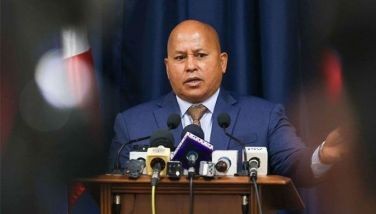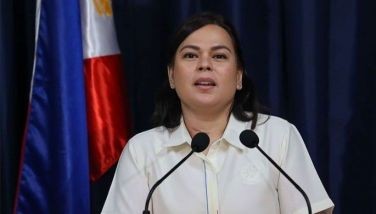PDIC head defends PNB rehab plan
February 21, 2002 | 12:00am
Philippine Deposit Insurance Corp. (PDIC) president and concurrent Philippine National Bank chairman Norberto C. Nazareno defended the proposed rehabilitation plan of PNB during a Senate hearing yesterday.
Nazareno said that the main objectives of the government are to make stable the operations of PNB to protect its depositors, particularly the small depositors, prevent systemic risks to ensure stability of the financial system and to enable the government to dispose of its shares in PNB at the best price after the bank’s operations have improved.
Considering the current quotations of PNB shares in the stock exchange of P75 per share, the proposed acquisition by the government of additional shares at P40 per share indicate the improved positions of the government.
Nazareno also stated that before the Lucio Tan Group took over PNB, the bank was experiencing liquidity problems and its capital was already below prescribed levels, thus requiring the infusion of additional capital in the bank which the government was unable to put up. These liquidity and solvency problems were attributed partly to the financial crisis in 1997 causing major borrowers to default and management deficiencies when the bank was under government management.
In previous statements, PNB president Feliciano L. Miranda Jr. emphasized that the loans of PNB that have become non-performing were all granted when the government was managing PNB and that these loans included loans granted to government entities which are now being offered for offset against PDIC loans.
Nazareno also clarified that the financial assistance extended by the Bangko Sentral ng Pilipinas (BSP) and PDIC was authorized under banking laws, are secured by good loans with loan values of only 50 percent of their face values and market rates. He also stressed that the present majority stockholder infused an additional capital of P19 billion. He contrasted these facts to that of another bank which could not offer collateral and put up additional capital or stockholder’s guaranty.
Nazareno added that the reverse privatization is intended to be temporary. As the bank’s operations shall have significantly improved, the process of finding a strong strategic investor for the bank and disposing a controlling share under a transparent manner can then proceed.
Nazareno clarified that his position as chairman of PNB was in accordance with the PDIC law. He stated, however, that he has inhibited himself from discussions by the PDIC board on matters about PNB.
Nazareno said that the main objectives of the government are to make stable the operations of PNB to protect its depositors, particularly the small depositors, prevent systemic risks to ensure stability of the financial system and to enable the government to dispose of its shares in PNB at the best price after the bank’s operations have improved.
Considering the current quotations of PNB shares in the stock exchange of P75 per share, the proposed acquisition by the government of additional shares at P40 per share indicate the improved positions of the government.
Nazareno also stated that before the Lucio Tan Group took over PNB, the bank was experiencing liquidity problems and its capital was already below prescribed levels, thus requiring the infusion of additional capital in the bank which the government was unable to put up. These liquidity and solvency problems were attributed partly to the financial crisis in 1997 causing major borrowers to default and management deficiencies when the bank was under government management.
In previous statements, PNB president Feliciano L. Miranda Jr. emphasized that the loans of PNB that have become non-performing were all granted when the government was managing PNB and that these loans included loans granted to government entities which are now being offered for offset against PDIC loans.
Nazareno also clarified that the financial assistance extended by the Bangko Sentral ng Pilipinas (BSP) and PDIC was authorized under banking laws, are secured by good loans with loan values of only 50 percent of their face values and market rates. He also stressed that the present majority stockholder infused an additional capital of P19 billion. He contrasted these facts to that of another bank which could not offer collateral and put up additional capital or stockholder’s guaranty.
Nazareno added that the reverse privatization is intended to be temporary. As the bank’s operations shall have significantly improved, the process of finding a strong strategic investor for the bank and disposing a controlling share under a transparent manner can then proceed.
Nazareno clarified that his position as chairman of PNB was in accordance with the PDIC law. He stated, however, that he has inhibited himself from discussions by the PDIC board on matters about PNB.
BrandSpace Articles
<
>
- Latest
- Trending
Trending
Latest
Trending
Latest
Recommended
































